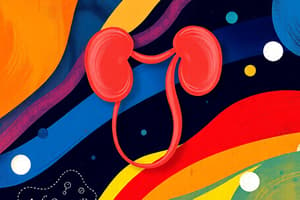Podcast
Questions and Answers
What is the main focus of Pharmalogy?
What is the main focus of Pharmalogy?
- The study of medical treatments and procedures
- The study of diseases and disorders
- The study of pharmaceuticals and their effects on living organisms (correct)
- The study of human anatomy and physiology
Which subdiscipline of Pharmalogy studies the absorption, distribution, metabolism, and excretion of drugs in the body?
Which subdiscipline of Pharmalogy studies the absorption, distribution, metabolism, and excretion of drugs in the body?
- Pharmacotherapeutics
- Pharmacokinetics (correct)
- Pharmacodynamics
- Toxicology
What is the term for the effect of a drug on the body?
What is the term for the effect of a drug on the body?
- Potency
- Efficacy
- Dose-response relationship
- Pharmacological response (correct)
What is the study of the therapeutic uses and applications of drugs in the treatment of diseases and disorders?
What is the study of the therapeutic uses and applications of drugs in the treatment of diseases and disorders?
What is the maximum response that can be produced by a drug?
What is the maximum response that can be produced by a drug?
Which application of Pharmalogy involves the monitoring and surveillance of drug safety and adverse effects in patients?
Which application of Pharmalogy involves the monitoring and surveillance of drug safety and adverse effects in patients?
What is the process of identifying, synthesizing, and testing new drugs for therapeutic potential?
What is the process of identifying, synthesizing, and testing new drugs for therapeutic potential?
What is the study of the use of drugs in clinical practice, including their safety, efficacy, and optimal dosing?
What is the study of the use of drugs in clinical practice, including their safety, efficacy, and optimal dosing?
Flashcards are hidden until you start studying
Study Notes
Definition and Scope
- Pharmalogy is a branch of pharmacology that deals with the study of pharmaceuticals and their effects on living organisms.
- It encompasses the study of drug discovery, development, and use, including their chemical composition, pharmacokinetics, pharmacodynamics, and therapeutic applications.
Subdisciplines of Pharmalogy
- Pharmacokinetics: the study of the absorption, distribution, metabolism, and excretion of drugs in the body.
- Pharmacodynamics: the study of the mechanisms of action of drugs on the body, including their effects on physiological systems and molecular targets.
- Pharmacotherapeutics: the study of the therapeutic uses and applications of drugs in the treatment of diseases and disorders.
- Toxicology: the study of the adverse effects of drugs and other chemicals on living organisms.
Key Concepts in Pharmalogy
- Pharmacological response: the effect of a drug on the body, which can be therapeutic or adverse.
- Dose-response relationship: the relationship between the dose of a drug and its pharmacological response.
- Potency: the ability of a drug to produce a pharmacological response at a given dose.
- Efficacy: the maximum response that can be produced by a drug.
Applications of Pharmalogy
- Drug discovery and development: the process of identifying, synthesizing, and testing new drugs for therapeutic potential.
- Clinical pharmacology: the study of the use of drugs in clinical practice, including their safety, efficacy, and optimal dosing.
- Pharmacovigilance: the monitoring and surveillance of drug safety and adverse effects in patients.
Definition and Scope of Pharmalogy
- Pharmalogy is a branch of pharmacology that studies pharmaceuticals and their effects on living organisms.
- It encompasses drug discovery, development, and use, including chemical composition, pharmacokinetics, pharmacodynamics, and therapeutic applications.
Subdisciplines of Pharmalogy
- Pharmacokinetics: studies absorption, distribution, metabolism, and excretion of drugs in the body.
- Pharmacodynamics: investigates mechanisms of drug action on the body, including effects on physiological systems and molecular targets.
- Pharmacotherapeutics: explores therapeutic uses and applications of drugs in treating diseases and disorders.
- Toxicology: examines adverse effects of drugs and other chemicals on living organisms.
Key Concepts in Pharmalogy
- Pharmacological response: the effect of a drug on the body, which can be therapeutic or adverse.
- Dose-response relationship: the relationship between the dose of a drug and its pharmacological response.
- Potency: a drug's ability to produce a pharmacological response at a given dose.
- Efficacy: the maximum response that can be produced by a drug.
Applications of Pharmalogy
- Drug discovery and development: involves identifying, synthesizing, and testing new drugs for therapeutic potential.
- Clinical pharmacology: studies the use of drugs in clinical practice, including safety, efficacy, and optimal dosing.
- Pharmacovigilance: monitors and surveils drug safety and adverse effects in patients.
Studying That Suits You
Use AI to generate personalized quizzes and flashcards to suit your learning preferences.




